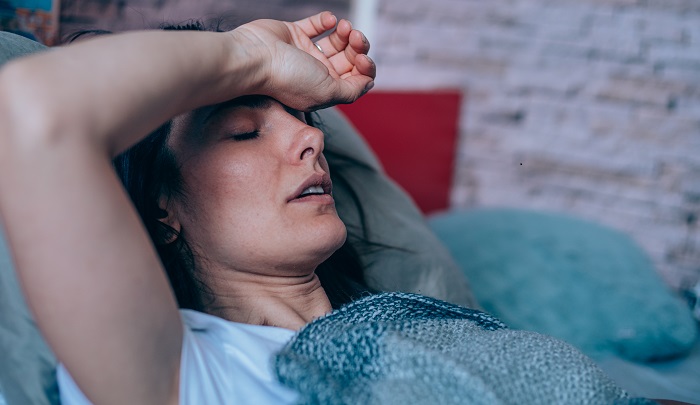The Relationship Between COVID-19 and Sleep

It’s hardly a surprise at this point to hear that getting your recommended 7 to 9 hours of sleep each night is good for your health. According to the Sleep Foundation, it enhances brain function, improves mood, regulates appetite, prevents chronic illness, and provides a host of other benefits. But of all sleep’s benefits, perhaps the most important factor in light of the COVID-19 pandemic is its impact on your immunity.
The American Sleep Association says that the relationship between sleep and the immune system is pretty straightforward. When you sleep, the immune system releases chemicals that improve how it functions. And research has shown that lack of sleep negatively impacts how the immune system responds to illness.
“It’s important to be aware of your sleeping patterns and quality of sleep because it affects your immune system and potential response to COVID-19 infection,” says Kori Ascher, M.D., a specialist at the Sleep Center at the University of Miami Health System.
How COVID-19 impacts sleep
Unfortunately, the COVID-19 pandemic has presented a bit of a catch-22 when it comes to sleep. Not only is getting restorative sleep each night critical for boosting immunity and fighting the virus, but COVID-19 actively makes this harder for people in a few different ways.
First off is the direct impact of a COVID-19 infection on sleep itself. “For those patients that have fallen ill with COVID-19, there is a whole new introduction of mechanisms to disturb sleep,” says Dr. Ascher. “The virus has been described as creating a cytokine storm. This mass release of cytokines ultimately creates a major inflammatory state for the entire body. An inflammatory state can perturb sleep, creating the sensation of non-restorative sleep and insomnia.”
People with severe COVID-19 illness may face even greater sleep-related challenges. “For those patients who are gravely ill from COVID-19 and require hospitalization, there is yet another confounding mechanism to disturb sleep,” says Dr. Ascher. “Hospitalized patients are subject to erratic sleep schedules due to mandatory checkups throughout the night, which likely disturb a normal sleep cycle.” Add the impact of medication and medical equipment to the equation, and it becomes even more difficult for hospitalized patients to get a good night’s sleep.
What does stress have to do with it?
More subtly, the pandemic impacts the sleep of even more people than those directly infected with the virus. That’s frequently due to stress. For many, the fear, uncertainty, and social isolation related to the pandemic have caused severe disruptions in their sleep cycles, even if they haven’t fallen ill. Those who have experienced income loss or other trauma due to the pandemic may experience more severe sleep difficulties. The journal Neurology Today says that neurologists have a term for this pandemic-induced lack of sleep: COVID-somnia.
How can I get good sleep?
Despite these current challenges, taking steps to get adequate sleep may be more critical now than ever. Not only can restful nights of sleep help boost immunity and help your body fight infection, but they can also help you recover more swiftly from an active illness. To help improve your sleep even in the face of an ongoing pandemic, the Sleep Foundation offers the following tips:
- Keep your bedroom cool, dark, and comfortable.
- Stick to a consistent sleep schedule as much as you can, even on the weekends.
- Consider banning or limiting screens from the bedroom. These devices can keep you awake longer at night.
- Avoid alcohol, caffeine, and large meals close to bedtime, and steer clear of tobacco entirely.
- Exercise earlier in the day, but not in the few hours before bedtime.
Melatonin, a popular sleep supplement, has also shown some promise in both preventing and reducing the severity of COVID-19 infection in preliminary studies. But Dr. Ascher says that more research is needed, and it’s still too early to make a recommendation related to melatonin intake and COVID-19. “Melatonin does have some anti-inflammatory properties,” she says. “However, based on current research, there is no recommendation for melatonin administration for treatment or prophylaxis of COVID-19.”
Wyatt Myers is a contributing writer for UMiami Health News.
Tags: COVID-19, Dr. Kori Ascher, Sleep
